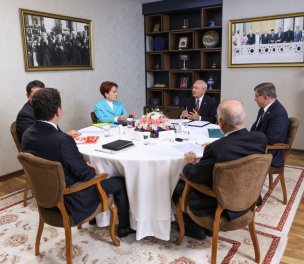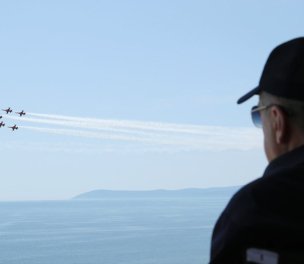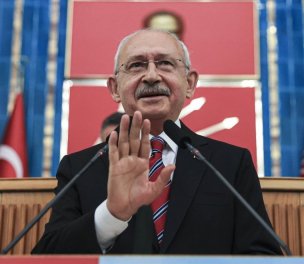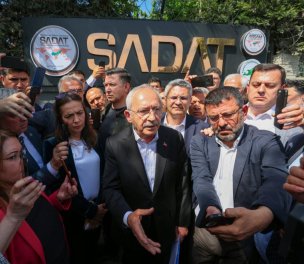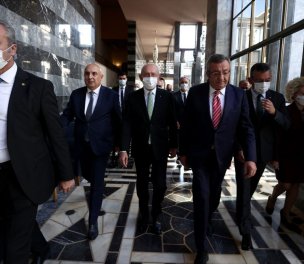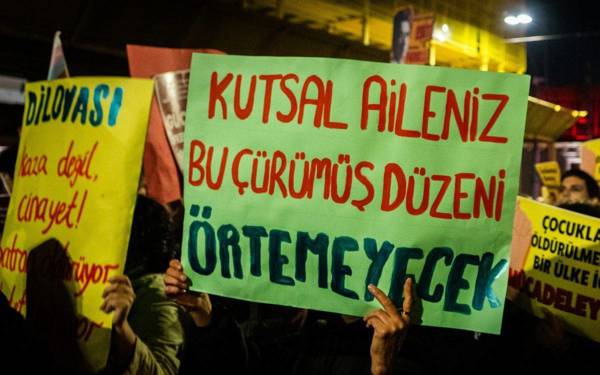Click to read the article in Turkish
Main opposition Republican People's Party (CHP) Chair Kemal Kılıçdaroğlu's recent claims that President Recep Tayyip Erdoğan is preparing to flee the country after losing the elections may indicate a new discourse strategy of the opposition, according to a political scientist.
Releasing a video on his Twitter account late Tuesday (May 24), Kılıçdaroğlu said two foundations close to the government had donated over 1 billion lira (~60 million US dollars) to another foundation they jointly founded in the US.
Disguised under educational activities, the money transfers were actually for the Erdoğan family, who plans to flee the country after an "inevitable" defeat in the next year's elections, according to Kılıçdaroğlu.
Government officials and the relevant foundations denied the allegations and said the donations were legal.
"I describe Kemal Kılıçdaroğlu's statement about the money smuggled into the US and presenting this as the government's escape plan as a new discourse strategy in terms of political communication," said Prof. Gülgün Erdoğan-Tosun.
Even though no one has yet fled to the US, the public wouldn't approve of such money transfers, considering the country's economic crisis, she noted.
While the government constantly advises the citizens to convert their "under the mattress" savings of foreign exchange and gold to the lira, it should explain why so much money was transferred to foreign countries, she added.
"Presenting the money transfers in question as an 'escape plan' may also be intended to draw attention to the competitive authoritarian system," said the professor.
In this system, she said, one of the government's primary strategies is to build and maintain the loyalty of the voters.
"While voter loyalty is managed through the social assistance distributed from public resources on the one hand, it is ensured through the bureaucrats ... who have become accomplices on the other hand," she said, mentioning Kılıçdaroğlu's call to bureaucrats not to comply with "illegal orders."
"Providing benefits to their own supporters legally or illegally is an important way to maintain this loyalty," she added.
Managing the perception
In the example of the ruling Justice and Development Party (AKP), she said, another important pillar of a competitive authoritarian system is to "manage the perception that they will win the elections."
"The perception that 'we will win no matter how many elections there will be'... At this point, Kılıçdaroğlu's statement of an escape plan replaced this perception with another one that ''hey won't be able to win the elections. This is why they are making preparations'," said Erdoğan-Tosun.
"While the perception of the election established by the government was that 'We will win the election under any circumstance,' Kılıçdaroğlu said, 'You will not win and you know that.'
"That's why there were so many reactions from the ruling circle. Because the government's strategy of managing the perception took a major blow.
"Since competitive authoritarian regimes continue their existence with elections, they don't usually participate in the elections that they will lose. In terms of political communication, the 'escape' statement is to give an important warning to the other party with the message that 'You are entering an election that you won't win'."
How will AKP voters react?
As for the consequences of Kılıçdaroğlu's statement for the voters, Erdoğan-Tosunoğlu said, if the AKP voters attribute the economic crisis to the money that is smuggled, the voter base of the ruling party may begin to "unravel."
She noted that Kılıçdaroğlu said in the video that "This is why there is no money for the retirees. This is why one liter of milk is 20 lira. This is why the electricity of four million subscribers is cut off."
"Therefore, transferring money abroad will raise question marks among the AKP voters, just as among all voters," she noted.
"One of the decisive points here will be the AKP's strategy of managing loyalty, and how long it can sustain the voter loyalty created by the state's distribution of resources like rewards.
"If the relationship of dependency it has established through the distribution of public resources continues for a long time, there will be no problem for the AKP base, but if the aid they receive is cut off or the benefits they receive from public resources diminish, then it might have a negative effect.
"Because according to the given sources, the number of social assistance recipients in Turkey is around 11-13 million (the number of registered members of the AKP is around 11 million), whereas the number of the AKP's votes is around 20 million. The connection between social assistance - party membership and the votes is important."
Another important point was that the pro-government media had to address the issue for the first time after Kılıçdaroğlu's statements, said Tosun-Erdoğan. "No matter from what perspective it is discussed ... it is an important move for the opposition that they discussed the issue by leaving their echo chambers."
Kılıçdaroğlu's political activism
Erdoğan-Tosun also commented on recent "visits" by Kılıçdaroğlu to official agencies such as the Ministry of Education, the Turkish Statistical Institute and the Milk and Meat Board, and SADAT, a private military contractor with close links to the government. The CHP leader was not allowed to enter any of these institutions and spoke to reporters in front of their buildings.
"We see that Kemal Kılıçdaroğlu has been [doing this] as a form of political activism in his strategy of opposition," she said. "In other words, it can be considered as a kind of political activism."
During his visit to SADAT, Kılıçdaroğlu had claimed the company, which it described as a group "training terrorists and paramilitaries," would threaten election security.
According to Erdoğan-Tosun, Kılıçdaroğlu is seeking answers for his questions about SADAT on the one hand, and on the other hand, he is looking for new methods of politics as such issues cannot be addressed in the parliament with the parliamentary questions by the opposition usually remain unanswered. (EMK/VK)





.jpg)
